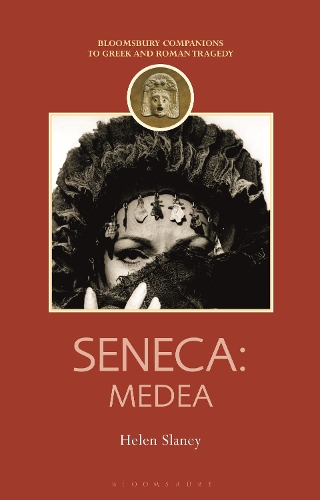
Seneca: Medea
(Paperback)
Available Formats
Publishing Details
Seneca: Medea
By (Author) Dr Helen Slaney
Bloomsbury Publishing PLC
Bloomsbury Academic
20th August 2020
United Kingdom
Classifications
Tertiary Education
Non Fiction
Literary studies: ancient, classical and medieval
872.01
Physical Properties
Paperback
208
Width 138mm, Height 214mm, Spine 12mm
260g
Description
Composed in early imperial Rome by Lucius Annaeus Seneca, Stoic philosopher and tutor to the emperor Nero, the tragedy Medea is dominated by the superhuman energy of its protagonist: diva, killer, enchantress, force of nature. Senecas treatment of the myth covers an episode identical to that of Euripides Greek version, enabling instructive comparisons to be drawn. Senecas Medea has challenged and fascinated theatre-makers across cultures and centuries and should be regarded as integral to the classical heritage of European theatre. This companion volume sketches the essentials of Senecas play and at the same time situates it within an interpretive tradition. It also uses Medea to illustrate key features of Senecan dramaturgy, the way in which language functions as a mode of theatrical representation and the way in which individuals are embedded in their surrounding conditions, resonating dissonantly with the principles of Roman Stoicism. By interweaving some of the plays subsequent receptions, theatrical and textual, into critical analysis of Medea as dramatic poetry, this companion volume will encourage the student to come to grips immediately with the ancient texts inherent multiplicity. In this way, reception theory informs not only the content of the volume but also, fundamentally, the way in which it is presented.
Reviews
Eminently suitable for the undergraduate reading Seneca or exploring Reception ... The extensive notes and bibliography also provide many opportunities for further exploration to interested readers. * The Journal of Classics Teaching *
Accessible and readable, and interesting in its approach to reception, weaving it into a reading of the play rather than appending it. * Greece & Rome *
Author Bio
Helen Slaney is a researcher in Classics and Humanities Research Facilitator at Roehampton University, UK. She has published extensively on Seneca and Latin literature, including The Senecan Aesthetic: A Performance History (2015).
